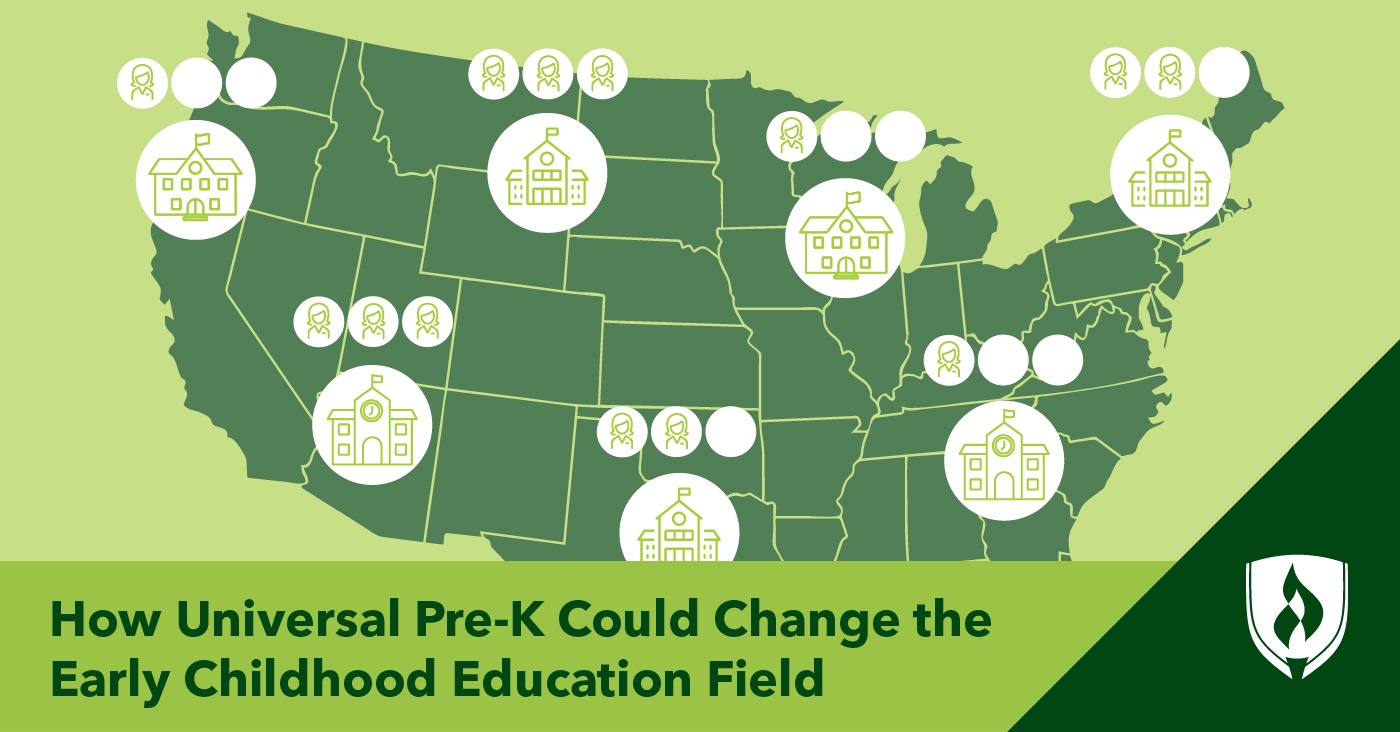How Universal Pre-K Could Change the Early Childhood Education Field
By Carrie Mesrobian on 07/19/2021

In April, President Joe Biden unveiled the American Families Plan, a $1.8 trillion plan for federal investment in education, childcare and paid family leave. Inside this proposal is $200 billion marked for universal preschool for all children aged three to four, aimed at helping five million children attend school and cutting costs for the average family by $13,000 if implemented.
Though the plan has yet to make it through the House and Senate, the proposal’s emergence has sparked many lofty policy conversations about the impact universal pre-K education could make on the nation’s economy and education system. But what could this proposal (or something similar) actually mean for early childhood educators and their employers? We asked early childhood education (ECE) professionals to share their thoughts on what universal pre-K might mean for the field. Explore the Pros and Cons of Universal Pre-K to gain a deeper understanding of the potential benefits and drawbacks of such a policy initiative.
What is universal pre-K, and why does it matter?
While there’s a lot of potential variables in how it is specifically implemented, universal pre-K refers to an expansion of public education funding to cover children aged three to four. Currently, many families cannot afford to pay for privately owned early education and care. Adoption of a universal pre-K plan would mean they would be able to send their children to preschool, just like kindergarten in public school, at no cost.
Mary Muhs, department chair of ECE and Human Services at Rasmussen University, says that should universal pre-K be implemented, it could provide more children with a strong foundation for lifelong learning.
“It could be a game-changer for many young children who do not have the opportunity to attend right now,” Muhs explains. “For the field of early childhood education, it may give a new visibility for the importance of learning and development in the younger years.”
Rebecah Freeling, a childhood behavior expert and family coach at Wits’ End Parenting®, welcomes the concept of universal pre-K. “In the whole balance of things, universal pre-K would be a plus,” Freeling says. “Especially for people who don’t have the money to send kids to preschool. Some people can’t afford or choose not to use it.”
How could universal pre-K offerings in the United States change the nation’s educational system?
The impact of publicly funded preschool education has been studied widely, and though the data doesn’t always point to an impact on easily quantifiable metrics, like standardized test scores, many argue the benefits are rooted more in the social gains for those who attend universal pre-K programs.
Jackie Mosqueda-Jones, an ECE educator with over 30 years in the field, believes strictly focusing on test scores misses the point, noting standardized testing can have flaws—particularly if you’re looking to assess critical thinking and social skills.
“What does matter to me is: Are they showing growth?” Mosqueda-Jones explains. “We don’t have tests that measure that right now.” Mosqueda-Jones says she is more interested in the social well-being of students who would now be able to attend pre-K programs.
“The studies I have looked at—25–40-year studies—show higher income rates, lower imprisonment rates, lower use of food stamps,” Mosqueda-Jones says. What universal pre-K could do is help level the playing field for many children in underserved communities and historically marginalized populations.
“Universal pre-K is imperative because we teach reading in kindergarten,” Mosqueda-Jones says. “If kids aren’t ready to learn by then, they’re already behind.”
Muhs agrees on the benefits of equitable preschool access. “Early childhood education is so much more than preparing students for their educational journey on an academic level,” Muhs says. “ECE provides children with regular, consistent and enriched opportunities for social interaction with a diverse group of peers, building skills in social and emotional and language development, as well as higher order thinking skills of self-regulation, problem-solving and risk-taking.”
These opportunities offered to all create a solid foundation on which later skill acquisition can happen. “The challenge is making sure that these programs are grounded in research,” Muhs continues. “Offering play-based and active-learning opportunities for these skills to be experienced in natural play interactions.”
Mosqueda-Jones’ experience has shown her the deep impact early childhood learning has on young brains.
“We know that kids who don’t have quality early childhood experiences never catch up,” Mosqueda-Jones explains. “The younger a person is, the shorter the time to change the brain wiring. That relates to prison population, crime in our area, our economic prosperity. If we really want to do right by all of us, we have to invest in our three- and four-year-olds because those brain windows start closing already at age five.”
How could universal pre-K impact professionals in the field of early childhood education?
The implementation of universal pre-K could quicken efforts to develop and potentially standardize qualifications for early childhood educators that have been growing in the ECE field in the last decade.
Muhs says that it’s clear that a strong educational foundation for early childhood educators is critical for providing high-quality instruction for children. “There is debate over whether a Bachelor’s degree is best for a leader educator in ECE programs,” Muhs says. “While I’m a proponent of higher education qualifications, it does not mean that educators have to have a particular piece of paper or license [to be effective].”
Instead, Muhs believes that early childhood educators who are best prepared have a deep understanding of their students’ needs and “have a command of the research, principles, standards, and perspectives and expectations for children from birth to age five.”
No matter how this looks as a credential or a degree, Muhs predicts that universal pre-K could continue building upon current trends.
“No matter what, I believe there will be a wider variety of educational pathways—embracing prior learning, competency-based education, micro-credentials and more—available to support educators in achieving their educational goals,” Muhs says.
Mosqueda-Jones believes that to implement universal pre-K effectively, family education must be involved. A licensed parent educator and early childhood family educator, Mosqueda-Jones sees much benefit in bringing families into the process.
“Once a family is truly engaged with education, that’s where we’re going to get our highest return on investment,” Mosqueda-Jones says.
How could universal pre-K change the ECE job market?
Would universal pre-K funding cause a surge in hiring as providers ramp up staffing to meet demand? Does anyone in a relatively solid position today potentially lose out as the market shifts? While important, it may be too early in the legislative process to predict outcomes. Muhs notes that shifts in the job market will depend heavily on the details of the plan.
“It will depend on how the universal pre-K is administered and rolled out,” Muhs explains. “If it is within the public education system, employment will likely be for those with advanced degrees or teacher licensure and, therefore, more limited. If it includes funding for the wider early childhood education field, including center-based, family childcare and other options, the capacity will be more widely available and allow opportunities for individuals with wider educational backgrounds.”
One major hang-up with taking the broader approach is ensuring providers adhere to quality standards. “If we don’t have some sort of regulation, then we won’t have the quality,” Mosqueda-Jones says. “If we don’t have the quality, why are we wasting our money?”
Another potential complication is accommodating the physical infrastructure within public schools. “If we do universal pre-K, we have a whole bunch of locations that have no place to put a pre-K,” Mosqueda-Jones says. “And with a pre-K, you need a bathroom. You need a certain amount of room. Unless you have under-capacity schools, you’re in trouble. To do it right, give us some time to get ready for it.”
“My hope is that universal pre-K capitalizes on the wider early childhood education field, including center-based programs, family childcare, private preschools, Head Start, etc.,” Muhs says, “so that families and children will have a choice in how and where they attend pre-K programs.”
Not taking this approach could mean reductions for preschool programs in community-center based programs and home childcare providers.
“Programs will go out of business, including those programs which serve ages birth to age three, as well,” Muhs continues. “A diverse system for delivering universal pre-K is not just supportive of families and children, but it is also supportive of high-quality early childhood education for all other ages as well.”
Muhs cites the state of Minnesota, which already offers robust pre-K opportunities for four-year-olds. “We must have a diverse system of getting the opportunity out to everyone who needs it, or it will not be ‘universal,’” Muhs continues.
Freeling also shares this concern.
“Some very good private preschools could go out of business,” Freeling says. “I would hope that there’s a public-private partnership, where private schools can receive some public funds so they can lower their tuition.” Freeling feels that universal pre-K would be best for all if, as Muhs believes, the whole spectrum of current programming is kept intact as much as possible.
“Don’t reorganize,” Freeling advises. “Subsidize, and make them more affordable.”
While Mosqueda-Jones applauds current programs that offer free preschool, she believes flexibility is key. “Right now, we have voluntary pre-K, which is tied to kids being ‘at risk’,” Mosqueda-Jones explains. This creates a classroom situation that is less than ideal. “Why put all the people in the same room who are all under stress?”
Along with the expertise required to work with children and families experiencing troubles comes the issue of pay. If implemented through the existing public school system, Muhs expects compensation could increase for those employed by public schools. On the flip side, this approach may narrow the field of ECE professionals who could benefit, at least in the short term.
“There may be less jobs than hoped, but more importantly, less available spaces for children.”
Permanently expanding any public service long term takes persuasion, and with early education, that benefit can be hard for some to immediately perceive. Passing a nationwide universal pre-K proposal could help lay a foundation for long-term, permanent investment.
“If we had a well-implemented and properly funded early childhood education system for all children, we would see more secure and supported families, confident and curious children, who grow up into inquisitive, problem-solving and globally-minded adults,” Muhs says. “The challenge is that the real benefit may not be seen in our immediate lifetime but in generations to come.”
Is your future in early childhood education?
Intrigued by the prospect of universal pre-K and wondering how an Early Childhood Education degree could prepare you to help make in a difference in the lives of young children and families? Our article “What Can You Do with an ECE Degree?” explores some of your potential options.
Related Articles:
Wits’ End Parenting is a registered trademark of Wits’ End Parenting, Inc.




